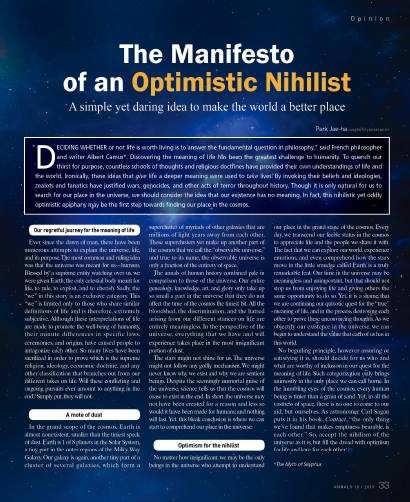A simple yet daring idea to make the world a better place

“DECIDING WHETHER or not life is worth living is to answer the fundamental question in philosophy,” said French philosopher and writer Albert Camus*. Discovering the meaning of life has been the greatest challenge to humanity. To quench our thirst for purpose, countless schools of thoughts and religious doctrines have provided their own understanding of life and the world. Ironically, these ideas that give life a deeper meaning were used to take lives. By invoking their beliefs and ideologies, zealots and fanatics have justified wars, genocides, and other acts of terror throughout history. Though it is only natural for us to search for our place in the universe, we should consider the idea that our existence has no meaning. In fact, this nihilistic yet oddly optimistic epiphany may be the first step towards finding our place in the cosmos.
Our regretful journey for the meaning of life
Ever since the dawn of man, there have been numerous attempts to explain the universe, life, and its purpose. The most common and ruling idea was that the universe was meant for us—humans. Blessed by a supreme entity watching over us, we were given Earth, the only celestial body meant for life, to rule, to exploit and to cherish. Sadly, the “we” in this story is an exclusive category. This “we” is limited only to those who share similar definitions of life and is therefore, extremely subjective. Although these interpretations of life are made to promote the well-being of humanity, their minute differences in specific laws, ceremonies and origins, have caused people to antagonize each other. So many lives have been sacrificed in order to prove which is the supreme religion, ideology, economic doctrine, and any other classification that branches out from our different takes on life. Will these conflicting and ongoing pursuits ever amount to anything in the end? Simply put, they will not.
A mote of dust
In the grand scope of the cosmos, Earth is almost nonexistent, smaller than the tiniest speck of dust. Earth is one of eight planets in the Solar System, a tiny part in the outer regions of the Milky Way Galaxy. Our galaxy is again, another tiny part of a cluster of several galaxies, which form a supercluster of myriads of other galaxies that are millions of light years away from each other. These superclusters yet make up another part of the cosmos that we call the “observable universe,” and true to its name, the observable universe is only a fraction of the entirety of space.
The annals of human history combined pale in comparison to those of the universe. Our entire genealogy, knowledge, art, and glory only take up so small a part in the universe that they don’t even affect the time of the cosmos the tiniest bit. All the bloodshed, the discrimination, and the hate arising from our different stances on life are entirely meaningless. In the perspective of the universe, everything that we have and will experience takes place in the most insignificant portion of dust.
The stars might not shine for us. The universe might not follow any godly mechanism. We might never know why we exist and why we are sentient beings. Despite the seemingly immortal guise of the universe, science tells us that the cosmos will cease to exist in the end. In short, the universe may not have been created for a reason and less so was it made for humans; and nothing will last. Yet, this bleak conclusion is where we can start to comprehend our place in the universe.
Optimism for the nihilist
No matter how insignificant, we may be the only beings in the universe who attempt to understand our place in the grand stage of the cosmos. Every day, we transcend our feeble status in the cosmos to appreciate life and the people we share it with. The fact that we can explore our world, experience emotions, and even comprehend how the stars move in the little smudge called Earth are truly remarkable feats. Our time in the universe may be meaningless and unimportant, but that should not stop us from enjoying life and giving others the same opportunity to do so. Yet, it is a shame that we are continuing our quixotic quest for the “true” meaning of life, and in the process, destroying each other to prove these unconvincing thoughts. As we objectify our existence in the universe, we can begin to understand the value that each of us has in this world.
No beguiling principle, however assuring or satisfying it is, should decide for us who and what are worthy of inclusion in our quest for the meaning of life. Such categorization only brings animosity in the only place we can call home. In the humbling eyes of the cosmos, every human being is tinier than a grain of sand. Yet, in all the vastness of space, there is no one to come to our aid, but ourselves. As astronomer Carl Sagan puts it in his book, Contact, “the only thing we’ve found that makes emptiness bearable, is each other.” So, accept the nihilism of the universe as it is, but fill the dread with optimism for life and love for each other.
*The Myth of Sisyphus
Park Jae-ha
wogk67@yonsei.ac.kr

